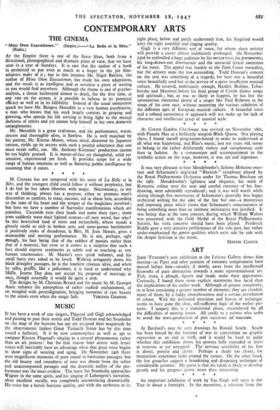CONTEMPORARY ARTS
THE CINEMA
n Mine Own Executioner." (Rialto.) (Empire.)—" La Belle et la Bete."
Ar the Empire there is one of the finest films, both from a directional, photographical and dramatic point of view, that we have seen in a year of Sundays. It is rare that the author of a book is permitted to put even as much as a finger in the pie film- adapters make of it ; but in this instance Mr. Nigel Balchin, the author of Mine Own Executioner, has made his own adaptation, and the result is as intelligent and as sensitive a piece of writing as you would find anywhere. Although the theme is one of psycho- analysis, a theme hackneyed almost to death, for the first time, at any rate on the screen, it is possible to believe in its potential efficacy as well as in its fallibility. Instead of the usual omniscient quack we have Mr. Burgess Meredith as a very human psychiatrist, a man who knows that his work largely consists in groping and guessing, who spends his life striving to bring light to the mental darkness of others and yet cannot help himself in his own domestic entanglements.
Mr. Meredith is a great craftsman, and his performance, warm, sincere and thoroughly alive, is flawless. He is well 'matched by his patient, Mr. Kieron Moore, whose mind, distorted by Japanese torture, yields up its secrets with such a painful reluctance that one must needs suffer, too. Mr. Anthony Kimmins' production cannot be too highly praised. It is matter-of-fact yet thoughtful, solid yet sensitive, experienced yet fresh. It provides scope for a wide range of human emotions as well as flattering public intelligence by assuming that it exists.
* * * *
M. Cocteau has not tampered with the story of La Belle et la Bite, and the youngest child could follow it without perplexity, but I do feel he has taken liberties with magic. Necromancy, to my way of thinking, always has a purpose, either to promote man's discomfort or comfort, to tease, succour, aid or abuse him, according to the state of his heart and the temper of the magicians involved ; but here we have a number of Surrealist manifestations which are pointless. Caryatids turn their heads and move their eyes ; stone arms suddenly wave their lighted sconces—all very weird, but why? In this bewitched land of mists and melancholy, where stands a ghostly castle so rich in broken urns and moss-grown battlements it positively reeks of decadence, la Bete, M. Jean Marais, gives a memorable and moving performance. He is not, perhaps, ugly enough, his face being that of the saddest of pussies rather than that of a monster, but even so it comes as a surprise that such a face should express sentiments as subtle and as touching as any human countenance. M. Marais's eyes speak volumes, and his small furry ears asked to be loved. Walking arrogantly down his black draughty passages, he is the loneliest creature alive, and when he talks, gruffly, like a policeman, it is hard to understand why Mdlle. Josette Day does not accept his proposal of marriage at once, though assuredly it would be quite a step.
The designs by M. Christian Berard and the music by M. Georges Auric enhance the atmosphere of rather studied enchantment, of art mingled with prestidigitation, bringing moments of rare beauty to the senses even when the magic fails. VIRGINIA GRAHAM.




























 Previous page
Previous page